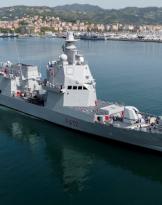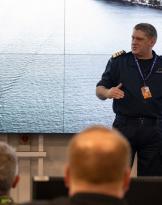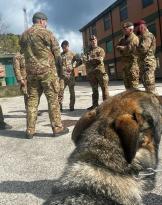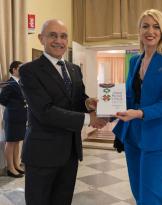In 2008, 36.951 migrants arrived on the Italian coast. Subsequently, in 2011, the year of the so-called "Arab Spring", 65.000 illegal immigrants landed. Operation Mare Nostrum in 2014 recorded 170.000 arrivals. This year to March 18, over 9.277 migrants arrived, almost double compared to the same period in 2014. The migratory emergency, therefore, is assuming extraordinary dimensions: Italy is no longer able to bear the costs alone (9 million per month) of Operation Mare Nostrum which has rescued boats as far as Libyan territorial waters. Operation Triton (under the aegis of the Frontex European Agency) will have a simple border surveillance mission and will not go beyond 30 nautical miles. There remains the obligation to rescue in the event of danger to human life, as sanctioned by current legislation. The arrival by sea of illegal immigrants in Italy is not only a threat to public order, in cases of refusal to be identified, but also constitutes a concrete possibility that terrorists trained to carry out attacks, the so-called foreign fighters, can infiltrate.
 In order to analyze these aspects from a legal point of view, prof. Elda Turco Bulgherini, professor of navigation law at the University of Rome Tor Vergata and president of the Roman section of AIDIM, the Italian Association of Maritime Law, organized a meeting held on March 20 at the Confitarma headquarters, between representatives of public and private entities that they are involved in various capacities in the so-called SAR (Search and Rescue) Operations in the Mediterranean. The teacher. Turco Bulgherini illustrated the regulatory framework by referring to the rules of internal law: the navigation code which provides for the obligation of rescue to the extent that the safety of the rescuing ship is not jeopardized; international conventions: the 1974 London Solas on the safeguarding of human life at sea, the 1979 Hamburg SAR on search and rescue, the 1982 Montego Bay Convention on International Law of the Sea, the 1989 London Salvage, as well as, lastly, the reg. (EU) 656/2014 which establishes the rules for the surveillance of the external maritime borders. The dispute with Malta is recalled, which claims a SAR area that partially overlaps with the Italian one and laps the Tunisian one.
In order to analyze these aspects from a legal point of view, prof. Elda Turco Bulgherini, professor of navigation law at the University of Rome Tor Vergata and president of the Roman section of AIDIM, the Italian Association of Maritime Law, organized a meeting held on March 20 at the Confitarma headquarters, between representatives of public and private entities that they are involved in various capacities in the so-called SAR (Search and Rescue) Operations in the Mediterranean. The teacher. Turco Bulgherini illustrated the regulatory framework by referring to the rules of internal law: the navigation code which provides for the obligation of rescue to the extent that the safety of the rescuing ship is not jeopardized; international conventions: the 1974 London Solas on the safeguarding of human life at sea, the 1979 Hamburg SAR on search and rescue, the 1982 Montego Bay Convention on International Law of the Sea, the 1989 London Salvage, as well as, lastly, the reg. (EU) 656/2014 which establishes the rules for the surveillance of the external maritime borders. The dispute with Malta is recalled, which claims a SAR area that partially overlaps with the Italian one and laps the Tunisian one.
The professor. Umberto Leanza, consultant for the litigation service of the Ministry of Foreign Affairs, carried out a brief excursus on the international regulations governing the protection of human life at sea, codified in 4 international Conventions, which establish two fundamental obligations for the States: to provide assistance. at sea and search and rescue. They are obligations of diligence and not of result. In any case, it is always necessary to use public resources and to resort to private ones in cases of evident lack of State resources.
 Admiral Giuseppe De Giorgi, Chief of Staff of the Navy, recalled that the institutional tasks of the Navy are those of surveillance at sea and on the high seas together with those of prevention. The operational reality has shown that the effective response to contingent emergencies must be sought in a cross-sectoral approach (the so-called cross sectoral approach) based on the subdivision of maritime spaces with a view to coordination and synergy of all assets operating at sea. . In fact, today the rescue at sea has become a mass rescue to which are added the serious dangers represented by the criminal organizations that manage these journeys of despair. It also highlighted the operational complementarity between the two components: the Harbor Master's Office aimed at the rescue and surveillance in coastal maritime activities and the Navy which is the armed side, with areas of competence ranging from safeguarding against the threats of international maritime spaces. , including the fight against piracy "one of the few levers we have to combat the phenomenon of migration and the armed reaction of men on civilian boats", in the fight against drug trafficking, in the water supply service in the smaller islands, that of supervision of maritime and economic activities, including fishing.
Admiral Giuseppe De Giorgi, Chief of Staff of the Navy, recalled that the institutional tasks of the Navy are those of surveillance at sea and on the high seas together with those of prevention. The operational reality has shown that the effective response to contingent emergencies must be sought in a cross-sectoral approach (the so-called cross sectoral approach) based on the subdivision of maritime spaces with a view to coordination and synergy of all assets operating at sea. . In fact, today the rescue at sea has become a mass rescue to which are added the serious dangers represented by the criminal organizations that manage these journeys of despair. It also highlighted the operational complementarity between the two components: the Harbor Master's Office aimed at the rescue and surveillance in coastal maritime activities and the Navy which is the armed side, with areas of competence ranging from safeguarding against the threats of international maritime spaces. , including the fight against piracy "one of the few levers we have to combat the phenomenon of migration and the armed reaction of men on civilian boats", in the fight against drug trafficking, in the water supply service in the smaller islands, that of supervision of maritime and economic activities, including fishing.
Admiral (CP) Felicio Angrisano, commander-in-chief of the Corps of the Port Authorities, recalled that since 1991, the Coast Guard has rescued and rescued over 470.000 migrants fleeing from unacceptable living conditions, so much so that willing to face the sea on dilapidated boats, putting their lives and that of their families at risk. This function is fulfilled in compliance with the international obligations that place the responsibility of the SAR National Authority in charge of safeguarding human life at sea in an area extended for over 500.000 km / q, within which the Port Authority Corps performs the function of technical-operational coordination of the national organization in charge of search and rescue. This function can also be exercised in distant geographical areas through the Rome Operations Center of the General Command of the Port Authorities.
 Brigadier General Stefano Screpanti, Head III Department of Operations General Command of the Guardia di Finanza, recalled that the protection of human life at sea is also the priority in the actions to combat illicit trafficking carried out in the territorial sea, in the contiguous area and in the waters from the Guardia di Finanza, underlining how “the same police operation, when it assumes dangerous profiles, becomes a rescue operation”. In the presence of danger for the vessel and for the people on board, police activity ceases and rescue operations start immediately, such as when a fishing boat carrying thirty tons of hashish on board was set on fire by the crew itself. and the financiers rescued the crewmen who had thrown themselves into the sea, thus transforming their operation from drug dealing into a Search and Rescue operation. Even in operations to combat illegal immigration, the safeguarding of life is a central objective, as prescribed by European Regulation 656 of 15 May 2014, which governs cooperation for the surveillance of the maritime border carried out under the aegis of Frontex, both from the operational plan operation "Triton", which has its International Coordination Center at the headquarters of the Guardia di Finanza in Pratica di Mare. In this scenario, it is necessary to implement every operational solution that, during the actions at sea, can support, without interfering with the priority activities of recovery and rescue of migrants, the acquisition of useful elements to initiate timely investigative and intelligence investigations. , to trace the supporters of trafficking, the logistical bases, the supply channels of the instrumental means used by traffickers of human beings. For these purposes, the Guardia di Finanza bases its action on the maximum integration between the air-naval device and the operational and investigative organization on the territory, which allows the timely connection with the competent judicial authorities and the rapid start of the necessary investigations, as well as the rapid activation of the channels. of international police cooperation.
Brigadier General Stefano Screpanti, Head III Department of Operations General Command of the Guardia di Finanza, recalled that the protection of human life at sea is also the priority in the actions to combat illicit trafficking carried out in the territorial sea, in the contiguous area and in the waters from the Guardia di Finanza, underlining how “the same police operation, when it assumes dangerous profiles, becomes a rescue operation”. In the presence of danger for the vessel and for the people on board, police activity ceases and rescue operations start immediately, such as when a fishing boat carrying thirty tons of hashish on board was set on fire by the crew itself. and the financiers rescued the crewmen who had thrown themselves into the sea, thus transforming their operation from drug dealing into a Search and Rescue operation. Even in operations to combat illegal immigration, the safeguarding of life is a central objective, as prescribed by European Regulation 656 of 15 May 2014, which governs cooperation for the surveillance of the maritime border carried out under the aegis of Frontex, both from the operational plan operation "Triton", which has its International Coordination Center at the headquarters of the Guardia di Finanza in Pratica di Mare. In this scenario, it is necessary to implement every operational solution that, during the actions at sea, can support, without interfering with the priority activities of recovery and rescue of migrants, the acquisition of useful elements to initiate timely investigative and intelligence investigations. , to trace the supporters of trafficking, the logistical bases, the supply channels of the instrumental means used by traffickers of human beings. For these purposes, the Guardia di Finanza bases its action on the maximum integration between the air-naval device and the operational and investigative organization on the territory, which allows the timely connection with the competent judicial authorities and the rapid start of the necessary investigations, as well as the rapid activation of the channels. of international police cooperation.
Plenipotentiary Minister Marco Del Panta, central director for migration policies of the Ministry of Foreign Affairs, stressed that the ministry plays a political and diplomatic role with international or bilateral agreements also in the field of migration. Speaking of Libya, he recalled that unfortunately today it is impossible to engage in any dialogue on the problems of migration, because there is no real interlocutor. In this context and in the impossibility of carrying out push-backs on the Libyan side, the Italian government, during the six-month presidency of the EU, launched a regional conference with the EU Commission and in synergy with the African Union which aims to strengthen relations between EU states and the states of the Horn of Africa, as well as the main transit states of the Mediterranean (Libya and Egypt) in terms of trafficking in human beings. This initiative called "Khartoum Process", which concerns the East Africa area, is completed with the "Rabat Process" started with the West African countries and aimed at managing migratory flows in compliance with human rights. The primary purpose is to strengthen partnerships with African countries of origin and transit and on this there is the full consent of the EU and African states, despite the awareness of the fragility of the political systems of these countries. These instruments of diplomatic relations, shared with the Ministry of the Interior, marked a turning point in the EU's migration policies.
 Dr. Giovanni Pinto, Regent Director of the Central Directorate of Immigration and Border Police - Department of Public Security of the Ministry of the Interior, focused his speech by explaining Operation Triton, underlining that "he never intended to resolve illegal immigration, but which simply represented an attempt to involve Europe which was no longer participating in any type of operation ”. Dr. Pinto then illustrated the scenario in which the Ministry of the Interior operates, and what the objectives achieved have been, such as with the flows from Turkey and Egypt, which at the moment have stopped thanks to synergies and dialogues with those States. He then explained that Triton “is a very different thing from an operation by a national institution. Mare Nostrum was the Navy, while Triton is an operation of Frontex, which is the agency for the operational coordination of border controls outside the European Union, which has no Serch and Rescue purpose "underlining that" we are facing an epochal theme with ordinary tools. It is no longer possible to manage situations of this kind with the legal, regulatory, relational and organizational tools at our disposal. We need to take a step forward to find new solutions ”.
Dr. Giovanni Pinto, Regent Director of the Central Directorate of Immigration and Border Police - Department of Public Security of the Ministry of the Interior, focused his speech by explaining Operation Triton, underlining that "he never intended to resolve illegal immigration, but which simply represented an attempt to involve Europe which was no longer participating in any type of operation ”. Dr. Pinto then illustrated the scenario in which the Ministry of the Interior operates, and what the objectives achieved have been, such as with the flows from Turkey and Egypt, which at the moment have stopped thanks to synergies and dialogues with those States. He then explained that Triton “is a very different thing from an operation by a national institution. Mare Nostrum was the Navy, while Triton is an operation of Frontex, which is the agency for the operational coordination of border controls outside the European Union, which has no Serch and Rescue purpose "underlining that" we are facing an epochal theme with ordinary tools. It is no longer possible to manage situations of this kind with the legal, regulatory, relational and organizational tools at our disposal. We need to take a step forward to find new solutions ”.
Even the prefect Carmine Valente, central director of civil services for immigration and asylum, underlined the serious difficulties that our country must face in managing the reception of so many refugees, many of whom require the recognition of the right to asylum through procedures that suffer from bureaucratic and judicial delays, with the consequence that the time of their stay in Italy is greatly extended, at the expense of the reception structures.
 Mario Mattioli, member of the Confitarma Council, recalled that the Confederation has pointed out at the highest institutional levels (Presidency of the Council of Ministers, all the Ministries concerned, COCIIST and CISM) that, in the absence of clear institutional coordination, the Libya emergency cannot be managed through the continuous and, therefore, not extraordinary, call of the merchant ships present in the area: in 2014, almost 900 merchant ships were called to help migrants. Of these, more than 250 units have embarked about 42.000 migrants out of a total of 170.000 rescued.
Mario Mattioli, member of the Confitarma Council, recalled that the Confederation has pointed out at the highest institutional levels (Presidency of the Council of Ministers, all the Ministries concerned, COCIIST and CISM) that, in the absence of clear institutional coordination, the Libya emergency cannot be managed through the continuous and, therefore, not extraordinary, call of the merchant ships present in the area: in 2014, almost 900 merchant ships were called to help migrants. Of these, more than 250 units have embarked about 42.000 migrants out of a total of 170.000 rescued.
As evidence of the difficult situation of shipowners operating in the waters of the Mediterranean, Mario Mattioli highlighted how his company in 2014 alone was called to make 59 migrant rescue trips with evident repercussions on sanitation conditions and obvious problems. of crew stress. Just think of the more than 1.050 refugees embarked on a single supply vessel, with a crew of only 10 people. Doctor Mattioli explained the situation of great commercial and economic hardship in which his fleet, his ships, civil boats, often find themselves in rescue operations. Often crews of twelve men find themselves assisting up to 1300 migrants, with danger for the crew itself, as they are not equipped for such situations. Often their route was diverted to another destination from the one planned, they were even called to go to rescue up to 4 miles from the Libyan coast, which resulted in delay in delivery of the goods and inconvenience for the crew, they are not ships equipped to give adequate assistance to migrants, who often find themselves on board for up to three days, without a doctor, without blankets, without water. Problems of an economic and safety aspect, also for the crews of the oil platforms to which they must guarantee assistance, noting that "the problem we encountered in moving the" Italian territorial borders "as close to the Libyan coast as possible created complications and an increase in flows, and - added Dr. Mattioli - it is unthinkable that a civil structure could face a disaster of this size ”.
A round table therefore that gave a vast panorama of opinions and explanations on the operations in progress and on what the needs are in the various sectors.












